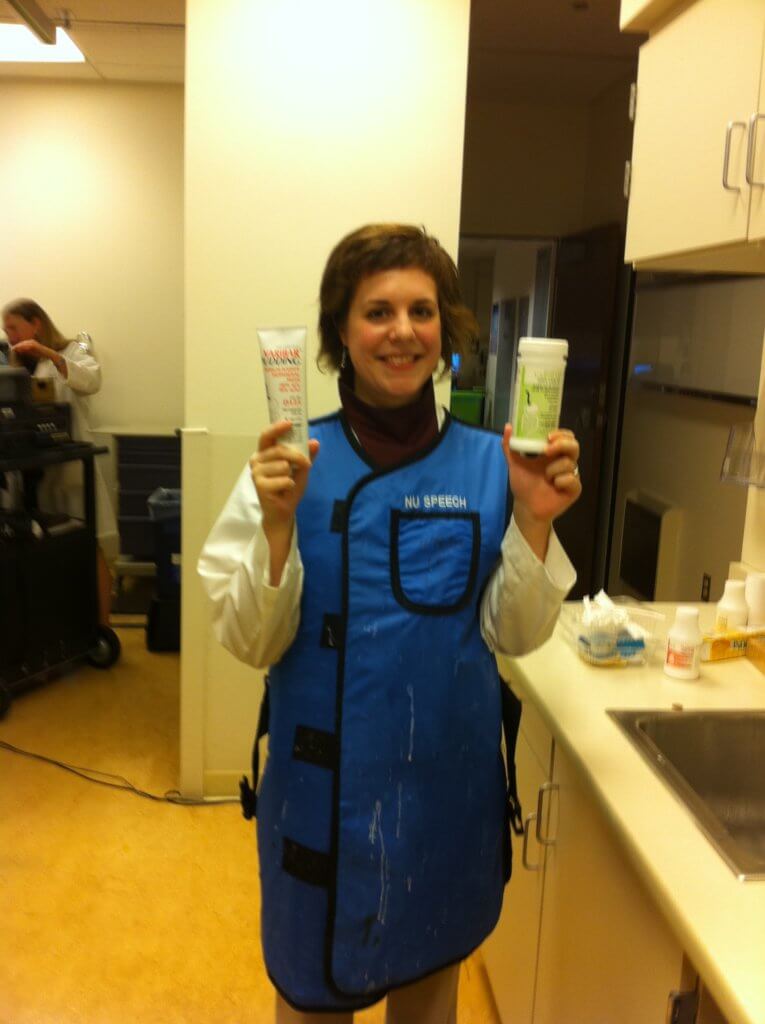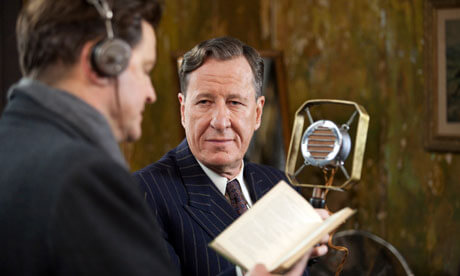I am terrible at introducing myself.
For someone who helps others with their elevator pitches, I do a woeful job of explaining what I do.
First, there is the problem of what I call myself. Speech therapist? (Old term, frowned upon within the profession.) Speech pathologist? (Better.) Speech-language pathologist? (Preferred industry title, but is a ridiculous mouthful IMHO.) SLP? (Works great with peers, not so much with layfolk.)

A speech-language pathology graduate student. X-ray gear and barium liquids, check!
[And for the many people out there who don't understand the difference between all these names...there is none. Yes, it is confusing.]
I usually go with "speech therapist", because it is the most economical in terms of syllables. This usually conjures up an image of a nice lady in a cardigan and ballet flats, sitting in a schoolroom, teaching young children to say /r/. (Which, of course, is a common occurrence for many of us, but just doesn't capture the full picture.)
What We Do
SLPs help people improve their ability to communicate. This is a powerful statement. Ironically, I think it is a such a bold statement that its meaning is completely lost on most people. Communication is one of those abilities like walking or having opposable thumbs that we completely take for granted. Unless, of course, something about it doesn't work properly.
The classic but limited perception of the pseudo-doctor-woman who helps kids pronounce the "th" sound minimizes not only speech therapy but also human communication as a whole. Similarly, the profound impact that a communication disorder has on one's life is not limited to severe brain injury, stroke, or congenital malformations. I have sat across from educated adults who tearfully describe the life activities they can't pursue because they are self-conscious about they way they say a certain sound. I've listened to stories of a how a stutter is a determining factor in what to name your first child, because you always stutter on words that start with vowels. "I always wanted to be a teacher, but since I'm not good at talking, I became an accountant instead."
This is what speech therapy is for.
What It Is
Not everyone who seeks out speech therapy is experiencing a major life impact due to a communication disorder. For some people, speech therapy is about improving specific technical patterns to achieve a more normal aesthetic. For others, though, it's the first step towards addressing a lifelong vulnerability.
I've noticed that people are very free about sharing when they are in physical therapy. "Oh, I twisted a joint / tore a ligament / broke a bone, need to work on it until it's fixed." Most people are very different when it comes to speech therapy. There is something very personal about our communication, which is formed by our heads and our hearts, compared to our physical bodies. Even when the communication disorder is physical in nature-- articulation, stuttering, or voice-- there is a strong self-worth, intelligence, or education load associated with it. To say, "I don't think I speak well, and I'm getting help for it," is a big deal.
What Happens
The most important question that I ask every single person who call me is: "What are your goals for a speech therapy program?" Even if the problem seems specific, "I have trouble with the /s/ sound," "I have a mild stutter," the goals communicate that this is about much more than "just" speech.
These are some of the goals my clients have created for themselves:
- I want to build more confidence.
- I don’t want my speech to hold me back from doing something.
- I want to be able to speak my mind freely as much as possible.
- I want to say what I want to say, when I want to say it.
- I want to choose the words I want any way I want them.
- I want to lessen my anxiety in social settings, especially at work.
- I want to overcome the feeling of avoiding people, and fear.
- I want to know there is hope.
What I Do
Speech therapy, as you can see, is about a lot more than just drilling your word lists so it comes out "right".
This is why I love what I do. My role, the SLP, the speech therapist, the speech-language pathologist, is to tell people: "You can do this. You will get there, and I am here to help you. There is hope."
I love getting random texts saying, "The job interview went great!" or "I'm totally crushing it at work!" or "I signed up for an online dating profile." My job, every week, is to meet with people as they discover they can do something, express themselves, in a way they thought they couldn't before.
What do I do? I'm an SLP.

Photograph: c.Weinstein/Everett / Rex Featur
